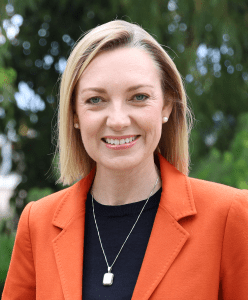
Mia Davies
THE live sheep export focused Keep the Sheep advocacy model and the Livestock Collective need to be continued, according to former Western Australian Nationals leader Mia Davies.
Keep the Sheep and the Livestock Collective have lobbied extensively in recent years for maintenance of live sheep exports by sea and at the recent WA Shearing Industry Association’s annual general meeting Ms Davies was asked to provide some advice on advocacy going forward.
Ms Davies congratulated WAIA president Darren Spencer and executive officer Valerie Pretzel for their roles in the Keep the Sheep movement and told Sheep Central it was important for WAIA members and industry to know they had been trusted and valuable advocates regardless of the outcome.
Ms Davies told Sheep Central the industry needs to regroup from the outcome of the live export industry, with the Federal Election meaning the Nationals did not get an opportunity to repeal the banning of the trade from May 2028.
“It’s my view that the model of advocacy by Keep the Sheep and the Livestock Collective needs to be continued – focussed, positive engagement with the community providing facts and sharing insights into the communities and businesses that rely on agriculture,” Ms Davies said.
“Individual groups can continue to deliver according to their purpose and membership, but where there are common threats and there needs to be a more co-ordinated approach,” she said.
“None of this is easy, but the fragmentation of our representative bodies and sector makes it easy for government to ignore us (the agricultural sector) and misses opportunities for engagement with a public that is indifferent at best and hostile at worst.”
Ms Davies was not prepared to make a running commentary on the current state and national farmer bodies, but observed that Keep the Sheep and The Livestock Collective had been a positive development in the advocacy space.
Ms Davies said it is critical that the industry is building capacity and capability in its advocates to engage effectively with decision makers in Australia’s parliaments.
“There is no question that the future of our rural communities and agricultural sector are dependent on the energy, commitment and local leadership skills that we ourselves generate.
“Because agriculture has an exciting story to tell and within that the sheep industries are key,” she told Sheep Central.
Ms Davies said the Merino is not a legacy breed, but a future-proofed product.
“It’s renewable, traceable, natural, and biodegradable.
“In a world drowning in synthetic fast fashion and food, the Merino is a quiet revolution waiting to be heard,” she said.
“But here’s the catch—we can’t rely on the product to sell itself.
“We must sell the system that supports it—and that includes the people, infrastructure, regulation, education and research it relies on,” she told Sheep Central.
“And there is a difference between educating to maintain what we have and building a base that will activate, defend and champion an industry.
“Australia was built on the sheep’s back.”
Ms Davies said the agricultural sector has banked on goodwill and trust for generations.
“But in the last two decades we have spent the principle and interest without topping up the account.
“Industry carried on, producing a beautiful product while the world we live in changed significantly,” she said.
“Urbanisation, media concentration, global trends and the political environment have changed our operating environment significantly.
“And I’m not sure we’ve kept pace.”
Ms Davies believes dismissing the political context we live in “will lead to further isolation and disconnect for an industry that is at the mercy of public sentiment – whether we think this is right or not.”
“A vacuum allows others to claim the space.”
Ms Davies believes The Livestock Collective and Keep the Sheep campaign did a power of work in an environment that ranged from indifference to outright hostile.
She said she was always impressed with the clarity and passion that Mr Spencer and Ms Pretzel delivered their message.
“How I wish this approach to education and engagement had existed 20 years ago.
“The simple reason it didn’t is because there were enough people in Parliament that understood primary production, agriculture and the settings required for success,” she said.
Ms Davies said agripolitical groups once had stronger membership and connection to decision makers and were protected by the political system.
“But in 20 years we have seen fundamental changes to the make-up of our Parliaments and our advocacy groups.
“It is undeniable that our advocacy groups have less members and are more fragmented,” she said.
“I would also argue there are too many for the size of the sector, and there’s overlap and duplication that needs to be addressed.”

HAVE YOUR SAY